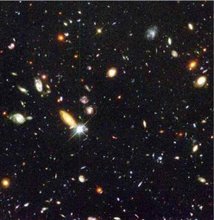Part One: The Long Version
This is the story about the beginning of the stars, except there really was no beginning so to speak, at least not in the way that we say beginning, because that would imply that time existed before time existed, which it could have, semantically speaking—I mean, we could ask, “What was there before time began?” but this logical lexography just can’t hold up to empirical evidence, which is to say, it was more like a non-beginning with a lot of stuff going on all at once, but the stuff wasn’t there before in the same way that it was there after the big non-beginning of the beginning of the stars and then stars were born, and from star dust, on a molecular level, your hands, my eyes, this page, these words.
Part Two: The Short Version
This is the story about the beginning of the stars. There really was no beginning, so to speak. At least not in the way we say beginning. That would imply that time existed before time existed. It could have existed, semantically speaking. We can ask, “What was there before time began?” But this logical lexography leads nowhere. It just can’t hold up to empirical evidence. In other words, it was more like a non-beginning. But there was a lot of stuff going on. And everything was happening at one time. But the stuff before was different from the stuff after. After the big non-beginning of the beginning, stars were born. And from star dust came hands, eyes, words, this page.
Subscribe to:
Post Comments (Atom)



No comments:
Post a Comment